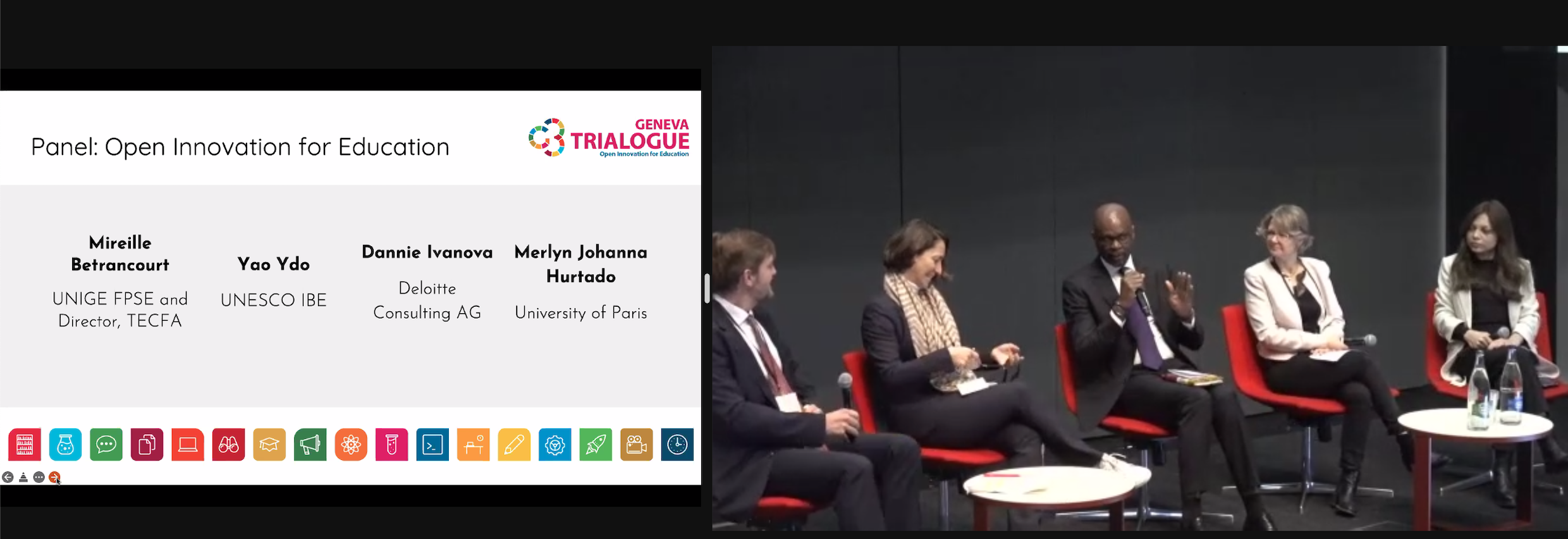
Entrepreneurship Research Center on G20 Economies of Tsinghua University participated in the 2022 Geneva Trialogue on March 17, co-hosted by the United Nations Institute for Training and Research (UNITAR), the University of Geneva and the Open Geneva.
With the theme of "Open Innovation in Education", the event focused on scaling up education to address the global challenges of the Sustainable Development Goals (SDGs). The professionals and youth from government and non-governmental organizations, academia and private sector circles from all over the world, guided by open innovation, interactively conducted 12 roundtables, in a bid to jointly explore the practical solutions and eventually produce positive impact on society and environment.
The Entrepreneurship Research Center on G20 Economies hosted a roundtable with the theme of "Open Innovation education for SDGs in Chinese Universities". The roundtable discussions were held online, and moderated by Ms. MAO Donghui, Executive Director of the China Steering Committee for SDGs Open Innovation Hackathon.

Parts of attendees of Tsinghua Roundtable

Geneva Trialogue on Open Innovation for Education
Open innovation is a practice for people working together in tackling problems and finding concrete resolution paths through the mobilization of collective intelligence locally and globally. Sustainable development aims to promote sustainable, inclusive and equitable economic growth, reduce inequalities, improve basic living standards, enhance equitable development and inclusion in societies, and boost the integrated and sustainable management of natural resources and ecosystems. The roundtable discussion, linking the above two important topics, hoped to promote the high-quality and large-scale development of sustainable development education in China in the form of open innovation.
Professor GAO Jian, Director of the Entrepreneurship Research Center on G20 Economies, delivered a welcome speech. Professor Gao pointed out that the practice of the SDGs Open Hack in Tsinghua University has proved that the innovation and entrepreneurship education for SDGs with open innovation is effective. According to the organizer's schedule, keyword of the first phase is Discovery, and the discovery of sustainable development education can be either problem-oriented or opportunity-oriented. Innovation and entrepreneurship education for SDGs, focuses simultaneously on environmental, social and economic effects. It encourages students to solve challenges of SDGs through technological innovation and effectively integrates the concept of SDGs with quality and ability education, which should not be only considered as a supplement to the "last mile".
Ms. ZHAO Yu, Deputy Secretary-General of the Association of Chinese Graduate Education, attended the roundtable. She first briefly introduced the development of China Post-graduate Innovation & Practice Competitions and then elaborated that either post-graduate innovation competition or the training of high-level talents should be closely combined with the national development strategy and the needs of enterprises and industries, and it is a credible attempt to use open innovation as an effective way to promote innovation and entrepreneurship education for SDGs.
Ms. Mao Donghui made an introduction in the Discovery Phase. She highlighted that the goal of innovation and entrepreneurship education for the SDGs should be to develop the education programs of generality and extensibility through standardized and patterned solutions, that is, to promote the large-scale and inclusive development.
Dr. Yu Fei, the research fellow at the Research Center of Technological Innovation of Tsinghua University, gave an inspiring sharing on the theme of SDGs and open innovation. He explained that open innovation can strengthen the connection between college students and the actual needs of enterprises, and promote multi-level cooperation between universities and enterprises. In addition, he suggested to take this roundtable as the kick-off to launch the China Sustainable Development and Open Innovation Forum, which can gather more resources and professionals to promote the further development of innovation and entrepreneurship education for SDGs. The proposal was unanimously approved by all the participants.
The specific topics discussed at the roundtable revolved around how to integrate innovation and entrepreneurship education into the curriculum of post-graduate training at Tsinghua Shenzhen International Graduate School. Professor HE Yonghong, Director of the Academic Affairs Office, and professor MA Yongbin, Director of the Center for Innovation and Entrepreneurship Education, introduced their discipline composition, the development of innovation and entrepreneurship education, and the goals and difficulties confronted. Tsinghua Shenzhen International Graduate School, undertaking 80% of training task of professional masters of Tsinghua University, currently has more than 4,600 master and doctor students. Combining with the new requirements of the China’s Ministry of Education to develop new engineering and postgraduate education, the innovation and entrepreneurship education in the School has entered its 3.0 version. The School continuously strengthens the cultivation of innovative quality and ability for postgraduates, takes active measures to build students' innovation practice bases, and pursues the innovation driven development of postgraduate training.
The attendees also put forward targeted suggestions for the innovation and entrepreneurship education for SDGs of Tsinghua Shenzhen International Graduate School, including cultivating students' comprehensive abilities based on industrial needs, promoting the effective integration of SDGs concepts and students' professional abilities, establishing an evaluation system for goal setting to help students set development goals, design training programs combining rigidity and flexibility, and guiding students to explore the innovation and entrepreneurship projects that take into account the economic, environmental, and social values.
A total of 15 attendees joined in the roundtable and expressed their views on sustainable development and open innovation based on their own practices and problems, and they mainly came from universities, colleges and enterprises, including: Tsinghua Shenzhen International Graduate School, Design Strategy and Prototype Innovation Institute of Tsinghua Art and Science Research Center, Global Learning Center of School of Social Science of Tsinghua University, Nanning College for Vocational Technology, PBL Teaching and Research Center of College of Education for the Future of Beijing Normal University, Innovation and Entrepreneurship Center of Beijing University of Science and Technology, the Square Strategic Research Institute and Faurecia Group China.
In the end, the Roundtable discussion reached the following consensus on promoting sustainable development education through open innovation: firstly, gather the outstanding sustainable development cases and best practices generated by the "Geneva Open Innovation Festival"and promote them in China; secondly, try to establish an open platform linking universities and innovation needs of enterprises; thirdly, organize a national post-graduate open innovation hackathon for SDGs; fourthly, establish demonstration bases for sustainable development and open innovation education in Chinese universities, accumulating experience for the development of sustainable development education; fifth, launch the China Sustainable Development and Open Innovation Forum, setting up a 50-person SDGs and Open Innovation Forum in Chinese Universities, gathering more resources and professionals, to promote the high-quality and large-scale development of innovation and entrepreneurship education for SDGs.
-------------------------------------------------------------------------------------------------------------------------------------------------
Attachment: UN SDGs
The Sustainable Development Goals (SDGs), were adopted by the United Nations as a universal call for actions to end poverty, protect the planet, and ensure that by 2030 all people enjoy peace and prosperity. The 17 SDGs were approved in 2015 by 193 members as part of the 2030 Agenda for Sustainable Development, which aims to fully address the three dimensions of social, economic and environmental development in an integrated manner from 2015 to 2030 and turn to the path of sustainable development.
Currently, progress on the SDGs is either stalled or reversed due to the impact of the Covid-19 pandemic. Therefore, the United Nations calls for collective action to accelerate the realization of the SDGs based on the cooperative network established by government and non-governmental organizations, education and technology communities, financial investment communities and industrial enterprises. In this process, China plays a very critical role. In order to achieve the its goals of "carbon peak" and "carbon neutrality", China needs to start from the education, which means to use sustainable development and open innovation as educational concepts and means, provide a learning environment, carry out SDGs learning and practical activities, provide enough and qualified talents for sustainable development.
17 SDGs:
1.No poverty: End poverty in all its forms everywhere
2.Zero Hunger: End hunger, achieve food security and improved nutrition and promote sustainable agriculture
3.Good Health and Wellbeing: Ensure healthy lives and promote well-being for all at all ages
4.Quality Education: Ensure inclusive and equitable quality education and promote lifelong learning opportunities for all
5.Gender Equality: Achieve gender equality and empower all women and girls
6.Clean Water and Sanitation: Ensure availability and sustainable management of water and sanitation for all
7.Affordable and Clean Energy: Ensure access to affordable, reliable, sustainable and modern energy for all
8.Decent Work and Economic Growth: Promote sustained, inclusive and sustainable economic growth, full and productive employment and decent work for all
9.Industry, Innovation and Infrastructure: Build resilient infrastructure, promote inclusive and sustainable industrialization and foster innovation
10.Reduced Inequalities: Reduce inequality within and among countries
11.Sustainable cities and communities: Make cities and human settlements inclusive, safe, resilient and sustainable
12.Sustainable Consumption and Production: Ensure sustainable consumption and production patterns
13.Climate Action: Take urgent action to combat climate change and its impacts
14.Life Under Water: Conserve and sustainably use the oceans, seas and marine resources for sustainable development
15.Life on Land: Protect, restore and promote sustainable use of terrestrial ecosystems, sustainably manage forests, combat desertification, halt and reverse land degradation, and halt biodiversity loss
16.Institutions, good governance: Promote peaceful and inclusive societies for sustainable development, provide access to justice for all and build effective, accountable and inclusive institutions at all levels
17.Partnerships for the goals: Strengthen the means of implementation and revitalize the global partnership for sustainable dev